When any film of Kamal releases – there would be sections in the audience having conversations of various emotions at varied degrees.
- A section that talks about how peeved it is, with Kamal taking a dig at its principles & practices;
- A section that talks about how complex the film was & why it will bomb in B&C Centres for that reason;
- Another section that feels how complex Kamal thinks he can be by adding a layer of unwanted complexity to the proceedings & make fun of him;
- One section that takes its job of finding references to earlier works in Hollywood & across world cinema from which Kamal has 'copied' very seriously;
- And then there is the section of Kamal fans who expect to see certain indulgences from the star & get delighted spotting whatever it can, as the narrative goes by.
Viewpoints and the emotional aggression with which they come may vary, but the fact that many a Hornet's nest gets stirred when a Kamal film releases, is a truth stranger than fiction. This article here comes from someone belonging to the last category mentioned & attempts at unveiling instances of 'Kamal films exclusive' indulgences seen in Uttama Villain.
- A lighter one to start things off. When Choku & Singh attempt to seat a fizzled out Manoranjan in a Multiplex closet room, his head accidentally bangs on the flush press & Boom – the sound of water gushing makes a noticeable presence. Insignificant but happens only in Kamal films – Remember the distinct sound of Cow urinating when Viruman & Annalatchmi have a candid conversation in the cow shed in Virumaandi?
- There would be street-smart inclusions of references aplenty in any Kamal film around ideas he believes in/propagates, Communism heading that list. Unlike an Anbe Sivam with Umpteen references, a single crisp one when the ministers talk of the King's now gone left ear ("Enna irundhaalum, Idadhu madhiri varumaa?!") is enough to let us take a peek at his trademark impishness.
- There will always be meaty scope for able performers. The case in point here are the roles on offer for the likes of Nasser, Oorvasi, MS Bhaskar, Gnyaanasambandham, Shanmugarajan (remember the wily Jail officer from Virumaandi?) & some deliberate inclusions like the offer of roles for Jayaram, Vaiyaapuri, the guy who plays messenger from the next kingdom (He was the cap-wearing remote pressing bomber from Vishwaroopam). A new entrant to this list is Prabhu, who played a vital role exceedingly well in the under-appreciated Poriyaalan .Who better than Kamal to spot such unknown talents.
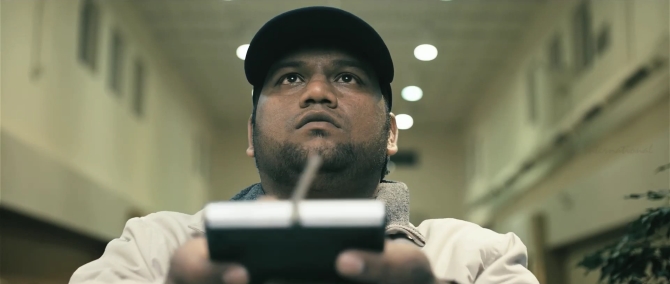
- Arpana, upon explaining the condition of Manoranjan to Maargadarsi, breaks down & requests him to show her the way to 'Rest room'. Kamal then 'generation-translates' the term to 'Bathroom' to a puzzled Margadarsi. Déjà vu Moment? Yes, the same improvisation found space and time in Anbe Sivam when Nalla tried to find a way at the house party organized by Bala to the toilet from the house maid. Little things, but Kamal things, these!
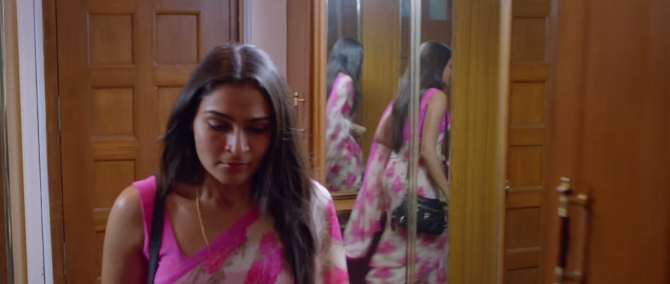
- Kamal, in an interview a few months back, had said he had liked Terrence Malick's The Tree of Life among films he'd recently watched. He promptly finds a way to mark his acknowledgment of the film with a passing reference to the film through a family tree he shows to his kids. Remember the passing reference in Indian to Schindler's List when Chandru woos Aishwarya into watching a film in Sathyam? ("Schindler's List; Arumayaana padam, kootame irukaadhu")
- Intricate shots that convey messages by themselves are other rudimentary fixations in Kamal films. Some instances of it in Uttama Villain here:
- Nostalgia inducing scenes are also expected of a Kamal film and when it is a film that is loosely about himself, the instances come and go pretty frequently. Nasser enjoying the dancer's enactment of Karpagavalli takes you back to the character he played in Magalir Mattum; Kamal with a tattooed face, body & a tonsured head takes you to Aalavandhaan; Caravan shots remind you of the more recent Manmadhan Ambu; there is also a reference to Nammavar when someone calls Uttaman that; the unmistakable leg-kick in the first song brings you memories of Chandru from Indian. I think the point is driven home & I will stop it here.
- Wordplays are an integral part of any Kamal film. It has been a while since he indulged this deep in it since Aalavandhaan (and the one off case of the controversial poem in Manmadhan Ambu). The Classic snippets he had written for the songs (the mindblowing Andhaadhi piece topping the list) in the film find more relevance & earn more respect when seen in the context of the film. Deliberate indulgence with wordplay finds its place with the homage paid to KB at the beginning of the film & through letters written between Ranjan & Yamini, which seem more like entries for an eloquence competition back in school, than emotional letters partners write before a possible separation.
- Multiple dialects or multiple languages – Linguistics is another obsession that is expected in a Kamal film and this Lingusamy production is no exception – Poorna Chandra Rao enlists his thoughts in bullet point form with A) & B) and converses in Telugu; Ranjan's son is seen to have a powerful English vocabulary, Choku takes care of the importance to dialect, with Uttaman showing how good Sanga Thamizh was & Zachariah expressing his thoughts in his native Malayalam – Mano Ranjan of course handles all the afore mentioned langs and slangs at ease.
- Now to the biggest of them all – The indulgence that peeves people of a particular religion; the indulgence Kamal can never do away with. The climax play role reversal(like what Tarantino does with Hitler in Inglourious Basterds) of Iraniyan (clad in Black dress symbolizing we know what!) and Narasimhan, is smartly foiled with the justification of having to see the story unfold from the view point of the dumb King & Uttaman and not from mythology's point of view itself. He succeeds, you give him that point! But the line on the gastronomic habits of certain Aariya Bhatters in an otherwise amazingly funny and creative Uttaman Kadhai song doesn't have any foil at all & can be seen to be in bad taste (pun intended) by a section of audiences which has never questioned the talent of Kamal the artiste & has stood by him for a major part of his early and mid-career.
If there is one indulgence I would like to see a lot less of from Kamal, it is this last one! The other 9 are sheer delights and I have already spotted some in Paapanaasam's trailer and will be on the lookout for more as the film releases!
Column written by Sivaram.L

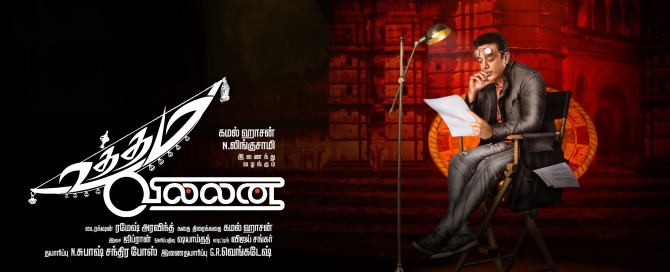
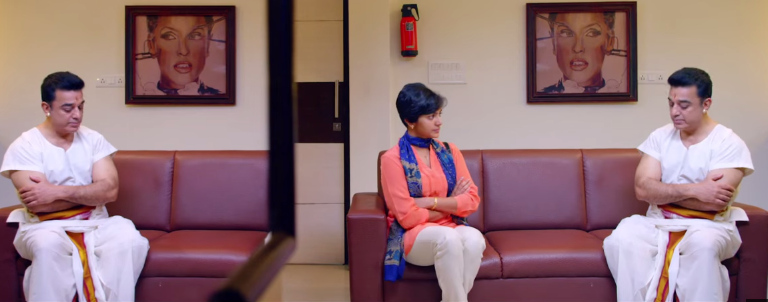

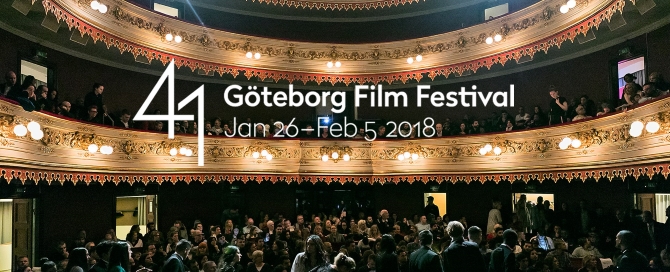
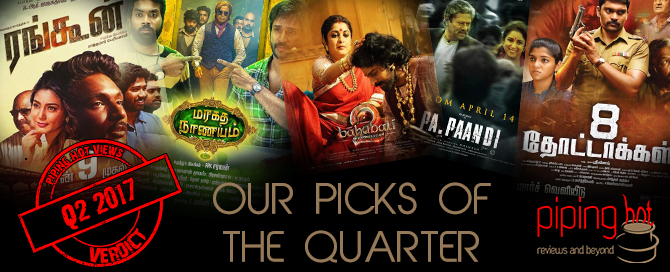
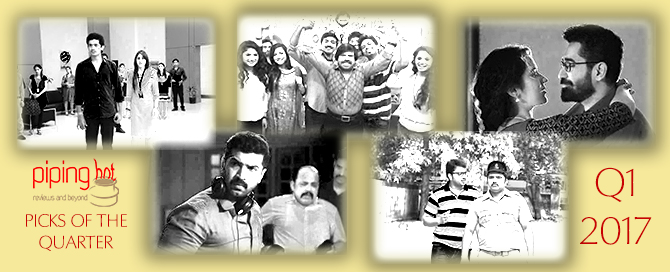
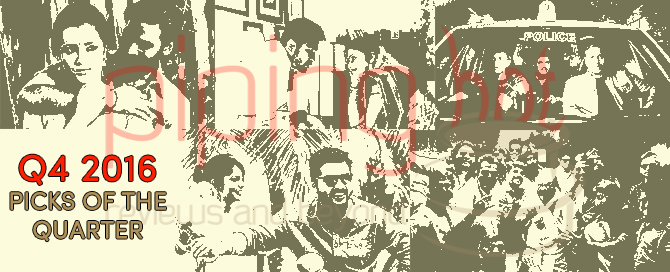
Leave A Comment